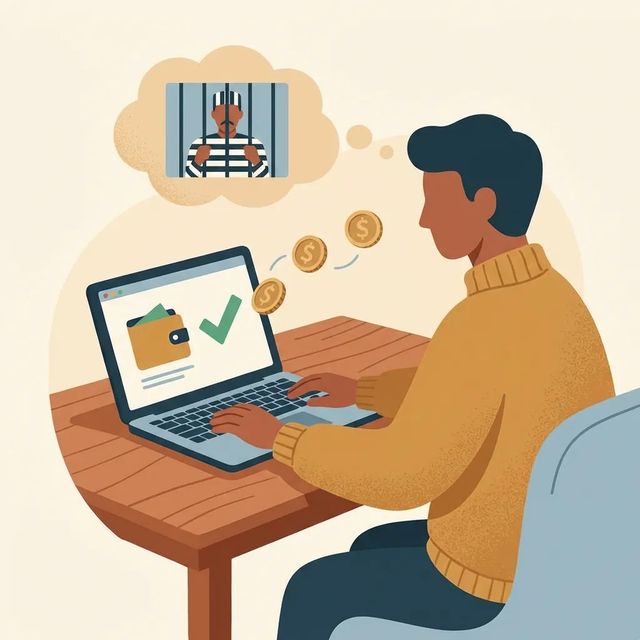Marion County Jail
Explore
Find an Inmate at Marion County Jail
Search for a loved one and send messages and photos in minutes.

Guides for This Facility

How to Visit Marion County Jail (OR)
Visiting someone connected to Marion County takes a little sorting out first. Not everyone is managed directly through the jail, so the fastest way to avoid a wasted trip is to confirm whether the person is housed at the jail or supervised through Marion County Community Corrections.
Read Guide
How to Contact an Inmate at Marion County Jail (OR)
Need to reach someone at Marion County Jail? Start with the jail's main phone line. For questions about specific departments, the Sheriff's Office can point you in the right direction.
Read Guide
How to Send Money to Marion County Jail (OR)
Sending money to someone in jail is straightforward once you know the deposit methods and required information. Here's what to know about Marion County Jail in Oregon.
Read GuideAt a Glance
Visitation
- Visitors must be on an approved list and cleared before scheduling a visit.
- All visits are monitored and require security screening and may be stopped or canceled for safety or staffing reasons.
- Many sites offer video or lobby-tablet visits in addition to in-person visits, with site-specific login and confirmation procedures.
Communication
- The Marion County Sheriff’s Office contact page provides a mailing address and emergency/non-emergency reporting phone numbers.
- Jail Manager Tad Larson’s address and contact details are listed in the county biennial plan.
- Sheriff Nicholas Hunter’s address, phone, fax, and email (including PO Box 14500) appear in the biennial plan.
Sending Money
- Marion County Jail's biennial budget lists 'Supervision Fees' as $0.00.
- Inmates commonly have separate accounts for phone/communication and commissary/trust purchases.
- Common deposit methods at many facilities include approved third‑party vendor websites or phone lines and lobby kiosks, though accepted options vary by facility.
Based on official sources and community feedback. Learn how we verify
Topic Overviews
Visitation
Before visiting someone at Marion County Jail, you'll need to be placed on an approved visitor list and cleared through a screening process. Submitting your information doesn't guarantee approval, and the person you want to visit can refuse visits. Visits generally need to be scheduled in advance. Video or lobby-tablet visits may require specific arrival procedures, confirmation codes, and arrival windows. All visits are monitored and involve security screening. Staff can cancel or end a visit for safety, security, or staffing reasons, and breaking the rules can get your visiting privileges suspended. Housing assignment matters too: people in special housing, disciplinary, or segregation units often have different visit rules and may only get non-contact visits behind glass. Fill out applications completely to avoid delays.
Read full guideCommunication
To set up phone calls, video visits, or messaging at Marion County Jail, start with the official contact lists. The county biennial plan and the Marion County Sheriff's Office contact page include administrative names and details for the Jail Manager, Sheriff, and Community Corrections director, plus the office mailing address and reporting phone numbers. Communication options at most jails include phone calls, video visits, and electronic messaging, though availability and rules vary by facility. You'll typically need to create an account with the jail's approved communications vendor and verify your phone number before receiving calls or scheduling video. For the approved vendor name, setup steps, or help troubleshooting call or video problems, reach out to the Jail Manager or the sheriff's office using those contacts.
Read full guideSending Money
If you need to put money on someone's account at Marion County Jail, here's what you can confirm: the Marion County biennial budget lists "Supervision Fees" as $0.00. Beyond that, the budget doesn't list accepted deposit vendors, schedules, or transaction fees, so verify the jail's current rules before sending funds. First, figure out which account you're funding. People often have separate accounts for communication or phone services and for commissary or trust purchases. Many jails accept deposits through approved third-party vendor websites or phone lines, as well as lobby kiosks. Some also allow mail or in-person deposits. If you plan to use a kiosk or deposit in person, bring valid photo identification and confirm the approved options ahead of time.
Read full guideCommon Questions
Showing 6 of 9How do I get approved to visit someone at Marion County Jail?
You'll need to be screened and approved before scheduling a visit. The person you plan to visit submits your biographical details for review, but approval isn't guaranteed. They can also decline visits.
VisitationCan I have physical contact with an inmate during visits at Marion County Jail?
It depends on the housing unit and visit type. Special housing and disciplinary-unit visits are often non-contact and conducted behind glass, so rules may be different from standard visits.
VisitationAre remote video visits available for Marion County Jail visitors?
Video visits may be available through lobby tablets or a video service, each with its own login and confirmation steps. Check the facility's scheduling process and any arrival or confirmation requirements before planning a remote visit.
VisitationHow do I contact an inmate at Marion County Jail?
The Marion County Sheriff's Office contact page has the facility mailing address and reporting phone numbers. For facility-specific communication rules and approved vendors, reach out to the Jail Manager listed in the county biennial plan. Generally, calls and video visits require an approved vendor account and phone number verification.
CommunicationWho should I contact about problems with calls or video visits at Marion County Jail?
Contact the Jail Manager Tad Larson or the Marion County Sheriff’s Office using the contacts listed in the biennial plan and on the sheriff’s office contact page. For broader corrections or program questions, the Community Corrections Director/Manager is also listed in the biennial plan.
CommunicationAre inmate phone calls and electronic messages private?
Most inmate calls and electronic communications go through third-party vendors and are not private. Expect monitoring, screening, and facility rules to apply. Since practices can vary, confirm the jail's monitoring and privacy policies with the contacts listed in the biennial plan or on the sheriff's website.
CommunicationMore Guides
Ready to Connect?
Search for your loved one to start communicating today
Did You Know?
The Marion County Sheriff's Office caseload report includes a generation timestamp showing when the roster was last updated.
This guide is based on feedback from dozens of families and official facility documentation. Learn how we verify
